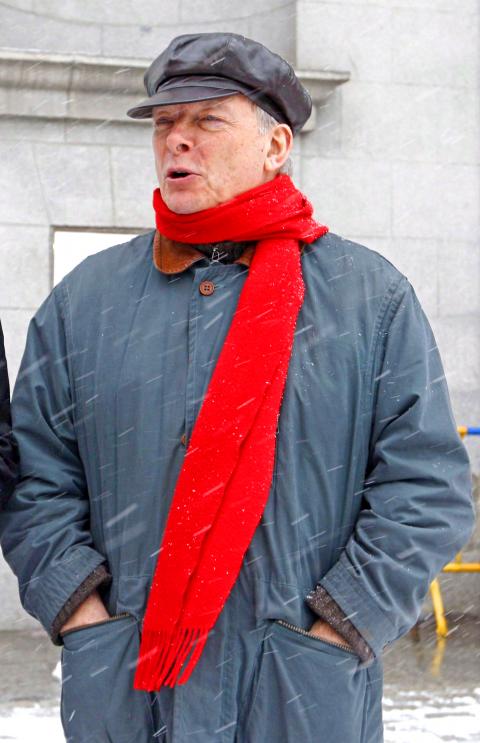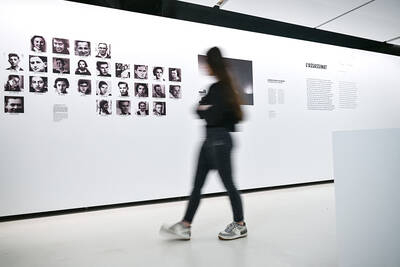Conductor Christopher Hogwood (1941-2014), who pioneered the performance of music by 18th-century composers such as Bach and Handel on period instruments, died Wednesday last week. He was 73.
The conductor’s Web site said he died at home in Cambridge, England following an illness lasting several months. His death was confirmed by the Academy of Ancient Music, the orchestra he founded in 1973 and with which he had many of his greatest successes.
Under Hogwood, the Academy played on period instruments and in period style as discerned from historical research. For instance, the stringed instruments used strings made of animal gut, instead of the metal-wound strings used in modern violins, violas and cellos. The result was a lighter, clearer sound now considered by some to better represent what the composers intended, or at least to provide an interesting new way to play long-familiar music.

Photo: EPA
照片:歐新社
During the 1970s and 80s, Hogwood and other British conductors such as John Eliot Gardiner (1943-) and Trevor Pinnock (1946-) helped popularize such historically informed performance, or HIP. Once the specialty of a few, this kind of playing spread to become commonplace. World-renowned cellist Yo-Yo Ma, for one, has added playing on an instrument set up in period fashion to his repertoire.
Hogwood made more than 200 recordings with the Academy, including a 1980 performance of George Frideric Handel’s (1685-1759) much-loved oratorio Messiah that BBC Music Magazine ranked as one of the top 50 recordings of all time. His work also extended to modern composers such as Stravinsky (1882-1971), Britten (1913-1976), Copland (1900-1990) and Tippett (1905-1998), and he recorded the complete symphonies of Mozart and Beethoven.
Hogwood was born on Sept. 10, 1941 in Nottingham, England and studied music and classical literature at Cambridge University’s Pembroke College, according to the Boston-based Handel and Haydn Society’s press release on its Web site.
In 1986, Hogwood took over the Handel and Haydn Society in Boston and completed its evolution into an all-period instrument ensemble, serving as artistic director for 15 years. He was slated to return as conductor laureate of the 200-year-old society in March to lead a performance of Felix Mendelssohn’s (1809-1847) Elijah.
Interestingly, in a 2013 interview with Classical Music magazine, Hogwood said historically informed playing was just one way of doing things. “There’s nothing wrong with playing things historically completely incorrectly,” he was quoted as saying. “Music is not a moral business, so you can play absolutely in a style that suits you and pleases your public. It may be completely unrecognizable to the composer, but so what, he’s dead.”
Harry Christophers, the current artistic director of the society, said Hogwood “set the world alight” with his advocacy of period performance. “He redefined our mission — to make the old sound new,’’ Christophers said in a statement.
The Academy of Ancient Music said Hogwood was survived by four younger siblings, three sisters and a brother. His Web site said the funeral would be private with a memorial service at a later date.
(AP)
率先倡導以古樂器演奏巴赫與韓德爾等十八世紀作曲家作品的指揮家克利斯朵夫‧霍格伍德(1941-2014),上週三與世長辭,享年七十三歲。
霍格伍德官網表示他是受持續數個月疾病之苦後,於其英國劍橋家中辭世。其死訊也得到霍格伍德一九七三年創立的「古樂學會樂團」證實,他也與該樂團共享許多偉大成就。
「古樂學會樂團」在霍格伍德帶領下,透過歷史文獻的考證解讀,以古樂器來做貼近作曲家時下的演奏風格。舉例來說,弦樂器弦線材質是用動物腸子,而非現代小中大提琴以金屬纏繞的弦。腸弦帶來一種較輕盈、透徹的聲音,這種演奏已被一些人認為更能呈現作曲家意圖的演奏樣貌。[即便無法忠實還原],藉由復古演奏方式演奏大家長久以來耳熟能詳的曲子,至少也能帶來聆賞上的新鮮感與趣味性。
在七零與八零年代,霍格伍德與其他像是約翰‧艾略特‧賈第納(1943-)與特雷弗‧平諾克(1946-)等英國指揮家對活化「復古風格演奏」(HIP),功不可沒。一開始是少數人鑽研的領域,後來這類演奏方式廣傳而普及。世界知名大提琴家馬友友就是一個例子,他已在其演奏曲目上加入古樂器演奏。
霍格伍德與「古樂學會樂團」錄製超過兩百張專輯,其中包括一九八0年演出韓德爾(1685-1759)深入民心的神劇《彌賽亞》,該唱片被英國《BBC音樂雜誌》選為評選史以來五十大最佳錄音之一。其曲目也延伸到像是史特拉汶斯基(1882-1971)、布瑞頓(1913-1976)、柯普蘭(1900-1990)與蒂皮特(1905-1998)等現代作曲家。他也錄製了全套莫札特與貝多芬的交響曲。
根據美國波士頓「韓德爾與海頓學會」網站的新聞稿,霍格伍德一九四一年生於英國諾丁漢,並在劍橋大學彭布羅克學院主修音樂與古典文學。霍格伍德一九八六年接下該學會藝術總監一職,十五年的任期間,完成將學會轉化為全古樂器演奏的室內樂團。他原訂明年三月以桂冠指揮身分在該學會兩百週年慶之際,指揮孟德爾頌(1809-1847)的《以利亞》。
有趣的是,二0一三年霍格伍德接受《古典音樂》雜誌專訪時指出,復古風格演奏只是眾多演奏方法之一,「以完完全全不合古人的方式,並沒有什麼不對。音樂不是道德問題,因此你絕對可以透過適合你的風格、聽眾喜歡的風格來呈現。就算作曲家聽不出來這是他的作品,那又如何?反正他已經死了。」
該學會現任藝術總監哈利‧克里斯多福表示,霍格伍德因為倡導以古樂器來忠實呈現作曲家自身時代的風格演奏,「點燃整個世界」。克里斯多福在一份聲明中說:「他重新定義了我們的使命—化古樂為新的聆賞體驗。」
「古樂學會樂團」表示,霍格伍德身後留下三位妹妹與一位弟弟。其網站表示,喪禮將不公開,追思會日期將後續公布。
(美聯社/翻譯:林亞蒂)

A ‘Dutch angle’ is a classic camera technique that has been used in filmmaking since the 1920s, when it was introduced to Hollywood by German Expressionists. Why is it called the Dutch angle if it’s actually German? In fact, it has no __1__ to the Netherlands. The term “Dutch” is widely believed to be a misinterpretation of “Deutsch,” which means German in the German language. In any event, the name stuck, and the Dutch angle remains a popular cinematic tool to this day. This technique involves tilting the camera on its x-axis, skewing the shot to create a sense of

A: After “God of Songs” Jacky Cheung sang for late singer Khalil Fong recently, music streaming service KKBOX also paid tribute to Fong by releasing his greatest hits online. B: The 20th KKBOX Music Awards ceremony is taking place at the K-Arena in Kaohsiung tomorrow. Fong performed at the ceremonies in the past. A: Who are the performers this year? B: The performers include Taiwanese groups 911, Wolf(s), Ozone, Singaporean pop diva Tanya Chua, and K-pop group Super Junior. A: South Korean stars actually took four spots among KKBOX’s 2024 Top 10 singles, showing that K-pop is still

Historians are rethinking the way the Holocaust is being presented in museums as the world marks the 80th anniversary of the liberation of the last Nazi concentration camps this month. Shocking images of the mass killings of Jews were “used massively at the end of World War II to show the violence of the Nazis,” historian Tal Bruttmann, a specialist on the Holocaust, told AFP. But in doing so “we kind of lost sight of the fact that is not normal to show” such graphic scenes of mass murder, of people being humiliated and dehumanized, he said. Up to this

Dos & Don’ts — 想想看,這句話英語該怎麼說? 1. 能做的事都做了。 ˇ All that could be done has been done. χ All that could be done have been done. 註︰all 指事情或抽象概念時當作單數。例如: All is well that ends well. (結果好就是好。) All is over with him. (他已經沒希望了。) That’s all for today. (今天到此為止。) all 指人時應當作複數。例如: All of us are interested in his proposal. All of us are doing our best. 2. 我們這麼做有益於我們的健康。 ˇ What we are doing is good for our health. χ What we are doing are good for our health. 註︰以關係代名詞 what 引導的作為主詞的子句,動詞用單數。如: What he said is true. 3. 大家都沿著步道跑。 ˇ Everybody runs along the trail. χ Everybody run along the trail. 註︰everyone 是指一大群人,但在文法上一般用單數。 4. 桌上有一本筆記本和兩支筆。 ˇ There were two